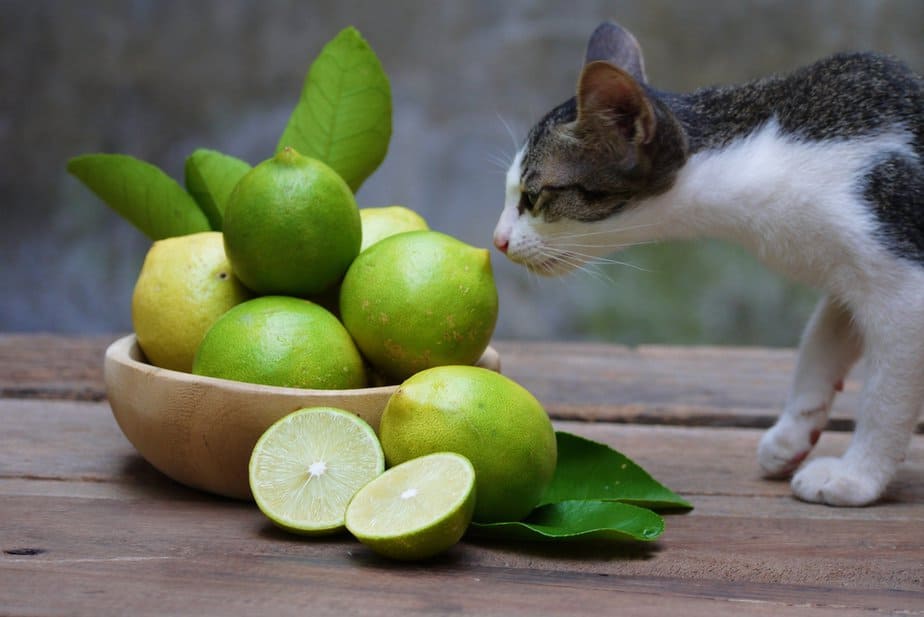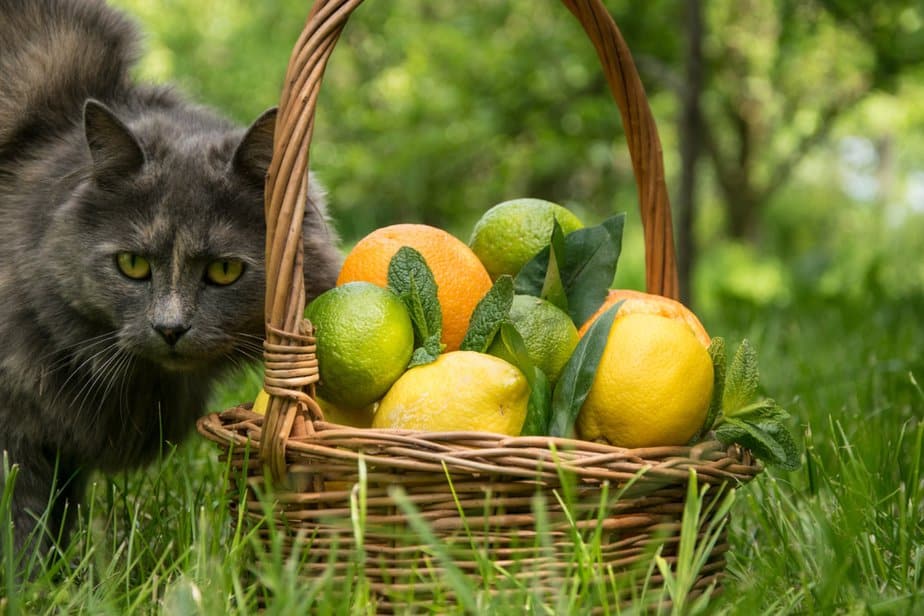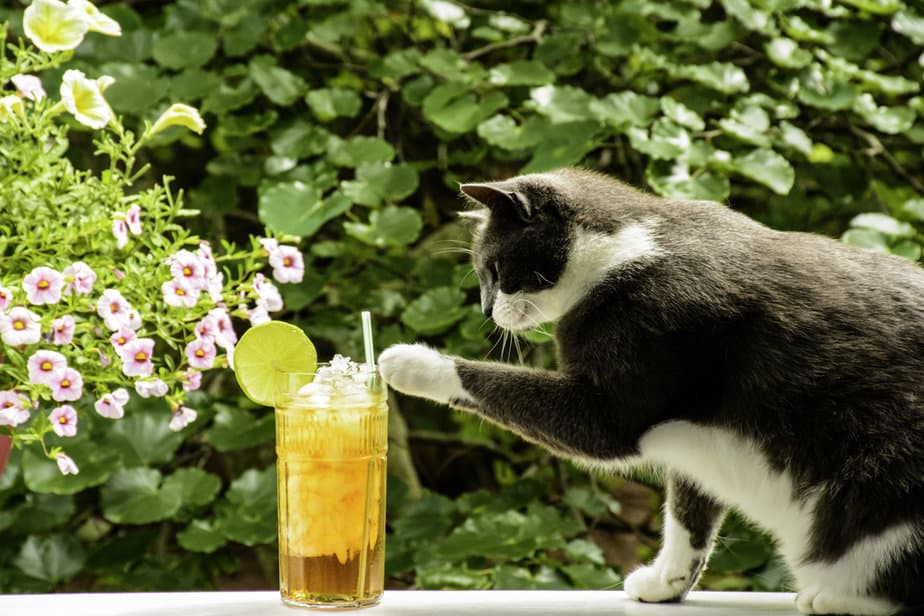📖 Table of Content:
Did you decide to use lemon’s cousin for a subtler citrus taste in today’s meal and your cat joined you in the kitchen? Did she decide to lick the slice you planned to use? No wonder you’re here googling “can cats eat limes?”
What’s got you worried more? The fact that she licked the lime and you’ve heard before that it may be poisonous? Or the fact that it was the last slice you had in your fridge and you wanted to avoid going to the shop?
I think you should be more worried about the former. Let’s be clear. Because of their natural survival instinct, they will mostly avoid all citrus fruit, but it’s always better to cautious.
Maybe you were trying out the new recipe for honey lime chicken you found online. Or you wanted to make some fluffy, flavored rice so you needed just a few drops of lime juice. Perhaps you were making chili and lime yogurt dip.
Whatever it is, you needed that green bitter-sweet slice, so you put it on your cutting board.
Naturally, the citrusy scent is going to turn cats off and make them go away. It’s just too much for their noses to handle. That’s why you’ve probably heard that you can use lemon scent while training your kitty to use the litterbox.
But this time, you added some appealing flavors, so your cat couldn’t resist giving it a lick. Or she kind of got confused because of the variety of smells in your kitchen. It doesn’t really matter, since we still have to find out if cats can eat limes and whether lemon and lime poisoning is a real thing or not.
Let’s get into it, shall we?
Can cats eat limes safely?
Limes are, like any citrus fruit, quite dangerous for our feline friends. Good thing is that they’ll mostly avoid it on their own because they really don’t like the smell.
Human food is mostly attractive to cats because of the texture and specific smell and, well, because cats are curious creatures by nature. Those are the most common reasons your furbaby will sniff around while you’re eating and try to take a bite.
Especially if she saw you enjoying that savory dish, she’s sure as heck going to want to try it out. Not to scare you completely, cats can eat small doses of limes, but only the juicy part. The rind of the lime is usually the most toxic part.
Lime is super healthy for us and we just can’t resist adding it to some of our meals. It even adds that extra something to those cocktails you sip on in summer. Am I right?
You probably cannot think of a reason good enough to avoid it, unless you’re allergic, that is.
Also, some substances that can be found in limes, and are toxic to cats, are actually good for us. For example, limonene is used in many cleaning products and it can be a good asset when treating certain illnesses.
The second chemical, psoralen, is used to cure some skin issues and it boosts our UV sensitivity levels. Because a human’s digestive system isn’t as sensitive as that of our feline friends, we can consume these two chemicals without any problems.
Anyway, cats generally despise citrus fruit, so the chances that she’ll taste it because she wants to, are extremely low. However, small parts of lime’s flesh won’t do her any harm.
In the next part, we’ll go through all the reasons why lime is toxic for cats and check out the symptoms of lemon and lime poisoning. Let’s go.
Why are limes toxic to cats?
Vitamin C is something we need for our immune system to function normally. But that is not the case with cats. The best thing is to keep your kitty away from any citrus fruit, like lemons, oranges, grapefruits, and of course, limes.
Why am I emphasizing this?
Citrus rind contains certain chemicals that are extremely harmful to your feline as her liver isn’t able to process them. It also has psoralens and limonene which can cause some gastrointestinal and neurological issues. But more on that later.
A bit of lime here and there isn’t necessarily lethal to your pet (it may cause an upset stomach, though), nor will drinking some juice, but it’s better to be mindful about it.
Usually, lime essential oils are to blame for this kind of poisoning. Maybe you sprayed a bit of it as a preventative because you wanted your cat to avoid some places at home. It’s not a big deal if you used a bit of it, but if your cat was under the “limelight” all the time, we have a problem.
Other things worth mentioning are some products that we use on a daily basis, even some that we use while we’re taking care of our pets. These include various shampoos and insecticidal products that contain limonene, which is a natural terpene.
If we apply them in prescribed doses and use them as recommended, there probably won’t be any problems. However, inappropriate usage can lead to poisoning because the excess can easily enter her bloodstream through her skin. And that’s where the problems start.
Symptoms of lemon and lime poisoning
Lemon and lime poisoning is not something that should worry you too much, even though there have been some cases with extreme reactions. But that generally depends on the cat’s weight and overall health.
So if you’re treating your furbaby right and she’s healthy, a little bit of lime or any citrus fruit won’t be dangerous. The inner part is not as dangerous as the rind, but it’s best to avoid letting her make contact with either.
Also, pay attention to the cat’s weight, because this small dose is determined mostly by that factor. Anything above that average dose can be toxic for your feline.
Symptoms of lemon and lime poisoning range from simple dermatitis to gastrointestinal and neurological complications. Some are easy to spot, others not as much.
If the poisoning results in dermatitis or skin inflammation, some parts of your feline’s body will become itchy. You’ll generally notice her discomfort and some red spots on her skin may appear as well.
Sometimes, in order to treat it, it will be enough for your kitty to stay away from the source of allergies. Other times, dietary changes will be required as well as some antibiotics, medicated baths, ointments, and/or antihistamines.
When it comes to gastrointestinal problems, you’re looking at an upset stomach with vomiting and diarrhea. More severe complications can happen with their neurological system. Photosensitivity, depressed central nervous system functioning, ataxia, and hypothermia are just some of them.
Also, her blood pressure may drop, and she can start trembling and eventually get hypothermia. If you don’t get your cat swift help, lemon and lime poisoning can lead to death.
Can cats drink lime juice?
Lime juice is extremely refreshing for us, especially during hot summer days. You can make limeade (you know, something like lemonade, just made out of limes), or you can add lime juice to your meal for added flavor.
Not only does it give that bitter-sweet taste to your otherwise ordinary salad, but it also doesn’t add any fat or a lot of calories! Perfect solution for your diet, right?
So what’s the situation between this magic potion and cats? Not a good one, I’m afraid.
Of course, a drop or two won’t kill your cat, but sharing a glass of limeade with her under the palm tree is certainly not a great choice. We’ve already explained that limes are toxic to cats, and we stated all the reasons to avoid feeding her any form of citrus.
Lemon and lime poisoning is the real deal, and even something as simple as lime juice can cause dangerous reactions. Giving her this fluid will turn any sweet experience into a bitter one.
So, don’t experiment with this citrus. It’s better to avoid lime in your cat’s diet completely.
That said, don’t worry too much if you served her fish prepared with a tiny dash of lime in its sauce. She’s probably going to enjoy the meal – she may just make funny facial expressions from time to time. Just keep a watchful eye on her for any possible symptoms.
So, what’s the takeaway? Can cats eat limes in the end?
In short, lime is toxic to cats. Lemon and lime poisoning is an actual concern, but it is something that can be treated. The most important thing is that you react on time and prevent incurable consequences.
If your cat has been exposed to lime, make sure you clean the environment where she’ll recover. It’s not going to be a long road, but she may need a specific diet and a bit of rest until she gets better.
Most of the symptoms she’ll experience are actually ways for her body to get rid of the toxins. So if she has a reaction to something she ate, it’s a good thing. At least you know something’s wrong and you can act immediately.





